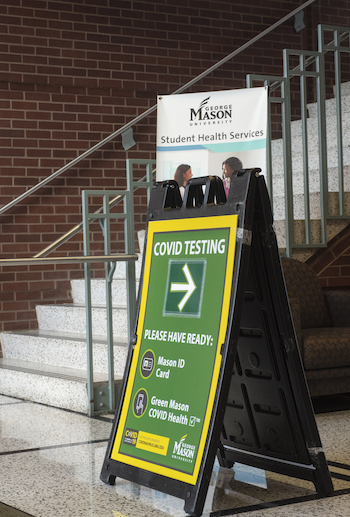
George Mason University has implemented several strategies to keep the campus community safe this fall during the evolving pandemic. Due to the ongoing risk of COVID-19, the university is requiring all students who live on campus to participate in mandatory routine COVID testing, regardless of vaccination status.
Vaccinated, non-residential students, faculty and staff are strongly encouraged to participate in the COVID surveillance testing to keep the university community safe.
“Even for people who are vaccinated, there are still breakthrough infections, and the surveillance testing is important to keep an eye on the campus to ensure safety, since a lot of people are back together,” said Angela Chezem, M.D., medical director at Mason‘s Safety, Emergency and Enterprise Risk Management (SEERM) office.
Chezem said COVID-19 and the delta variant have been increasing across the United States and in the Washington, D.C., metropolitan area. As the university community has returned for in-person classes and activities, she said keeping a close eye on public health will be vital for keeping campus safe.
“Our ability to have a more vibrant campus this academic year depends on all of us doing our part,” said Julie Zobel, associate vice president of SEERM. “We need to double down on our commitment to Mason’s public health and safety precautions: vaccination, staying home when not well, wearing masks, distancing, completing the Mason COVID Health Check daily, testing, and implementing good hygiene practices.”
Vaccinated residential students will test weekly for the first three weeks of classes. Subsequently, testing for this group may reduce to once every two weeks, pending the number of cases and prevalence in the area. Unvaccinated residential students with an approved exemption are required to test twice per week during the semester. Nonresidential unvaccinated students and unvaccinated employees with an approved exemption are required to test once per week. Nonresidential vaccinated students and employees may be chosen randomly for testing.
For students and employees in high-contact roles where there is close contact with other individuals, such as Athletics and student organizations that host large, in-person events, testing may be required more frequently. To accommodate diverse schedules, Mason is offering extended testing hours at the Arlington and Fairfax Campuses. Learn more about Mason’s COVID-19 surveillance testing here.
Students, faculty and staff are advised to pay close attention to their Mason email, the official means by which they will be informed about individual testing requirements.
Mason is requiring COVID vaccines for all students, faculty and staff, unless they have an approved medical or religious exemption. Even with the requirement, surveillance testing is essential, Mason experts said.
“Vaccines are still important because they lessen the number of infections, and typically those infections are less severe; but an infection can still happen because there are variants,” Chezem said.
Without surveillance testing, it would be difficult to identify outbreaks within the university community and therefore extremely difficult to control the spread of the disease within Mason’s population.
Coming back to campus for in-person classes is a sign of progress, Chezem said, adding that she hopes students, faculty and staff see the surveillance testing effort as beneficial for everyone.
“We want to try to ensure that people feel the campus is a safe place to be and that we’re keeping a close eye on things to be able to stay in-person on campus,” she said.
